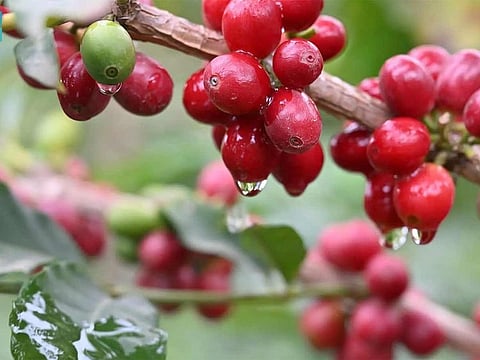Coffee bean prices to stay high as supply disruptions lead to rising costs
Shortages of cheaper robusta beans fire up demand for arabica variety

A cup of coffee is set to get even pricier as persistent supply disruptions push costs for premium arabica beans to the highest in 13 years.
Futures, i.e. contracts bought at agreed prices but delivered and paid for later, surged as much as 2 per cent to $2.6475 per pound, the highest since 2011.
The futures for the variety have surged 40 per cent this year as shortages of the cheaper robusta beans stoke demand for the arabica variety favored by specialty chains.
Coffee rally’s has been gathering pace from ongoing concerns about harsh weather in top two producers Brazil and Vietnam. The nation is wrapping up its 2024-25 harvest and production prospects weakened after heat and dryness hurt fields.
Attention is now shifting to next season’s potential, and Brazil has been gripped by its worst drought in decades, threatening further crop damage.
Across the supply chain, the impact of this year’s rally is already evident. JM Smucker Co., whose brands like Folgers and CafA(c) Bustelo dominate the US’s at-home coffee market, hiked its prices earlier this summer. Restaurant chain Pret A Manger scrapped its UK coffee subscription that gave customers as many as five drinks per day.
The recent jump in arabica futures has helped to widen a premium the contract commands over the cheaper robusta bean. Even so, the spread between the two varieties remains historically low, meaning roasters are likely to replace robusta for arabica in their blends.
What adds to supply fears?
Concerns about the next harvest are adding to supply fears after hot and dry weather in parts of Vietnam damaged coffee trees earlier this year, and Super Typhoon Yagi and its aftermath cut a swath of destruction across north Vietnam.
Brazil’s top growing regions have also faced the brunt of harsh weather, pushing up arabica prices to multi-year high.
The higher prices, combined with rising shipping costs due to disruptions in the Suez Canal and a stronger dollar, have seen the Italian roaster’s costs jump more than €800 million ($865 million) in the last two years, Lavazza added.
With the European Union Deforestation Regulation or EUDR kicking in by the end of the year “a lot of players are buying coffee a little bit earlier,” Lavazza said, looking to bypass the requirement to prove their supply chains aren’t linked to land that was deforested after 2020.
“No doubt that the coffee that European roasters are going to buy will cost much more,” he added. “Companies in the coffee industry are facing very strong headwinds.”
Stronger shipments from Brazil and other top producers “could help defuse supply and price concerns,” and global coffee prices appear to have peaked, Bloomberg Intelligence analyst Alvin Tai wrote in a note. Still, retailers may be passing on residual high prices to consumers, Tai said.
Coffee’s advance is adding to inflation across the beverage aisle. Orange juice prices have also spiked due to production shortfalls and a record run-up in cocoa futures is boosting costs for chocolate drinks and desserts. Still, prices for other major staples - like grains - remain subdued, tempering overall food inflation.
Sign up for the Daily Briefing
Get the latest news and updates straight to your inbox


